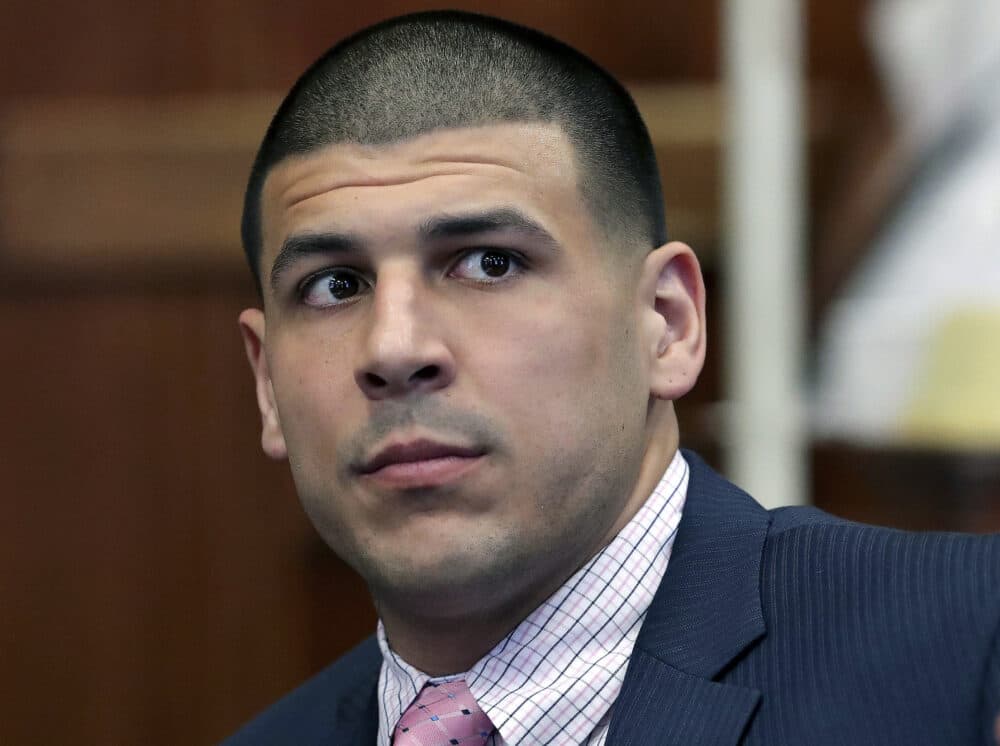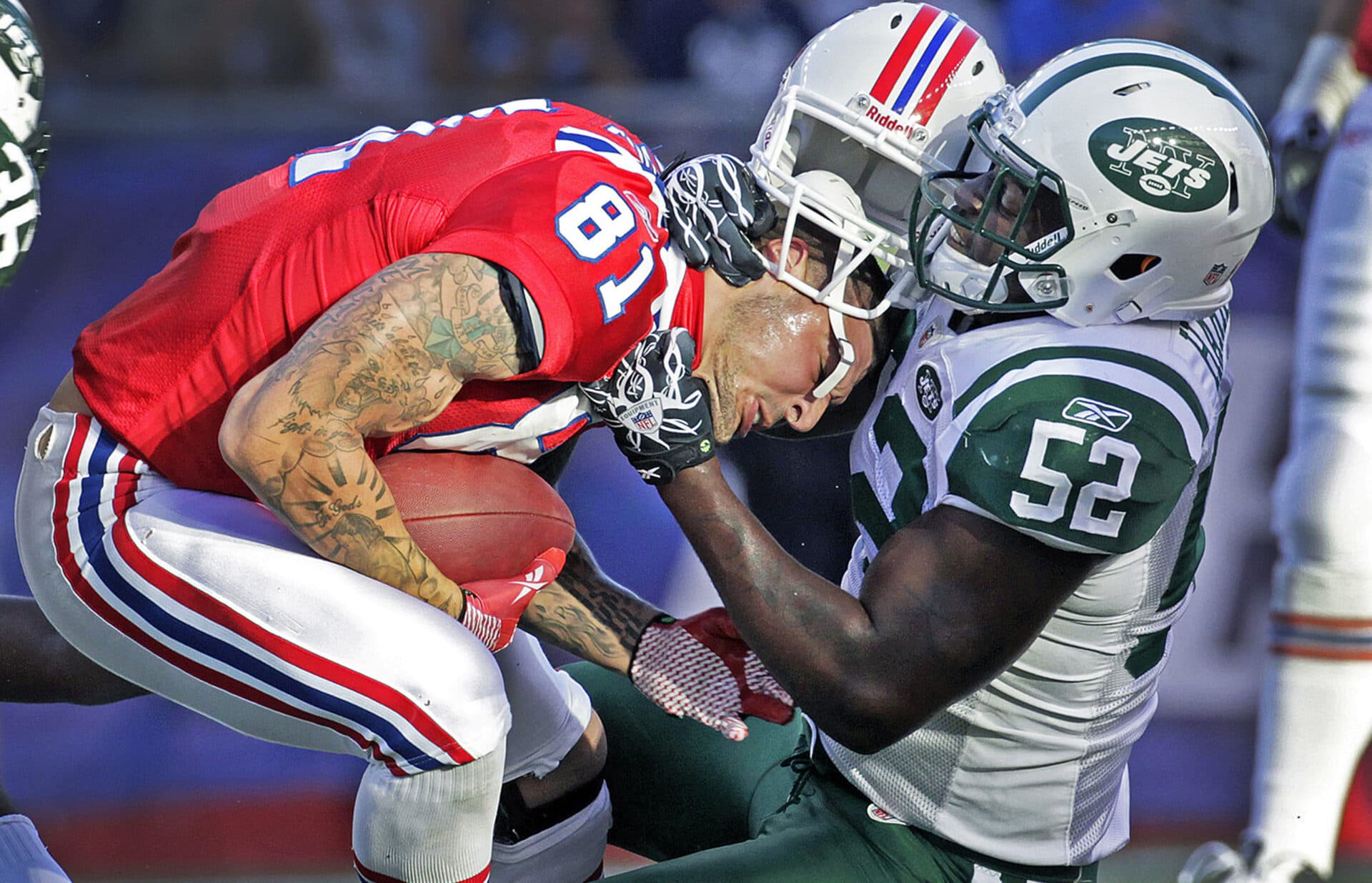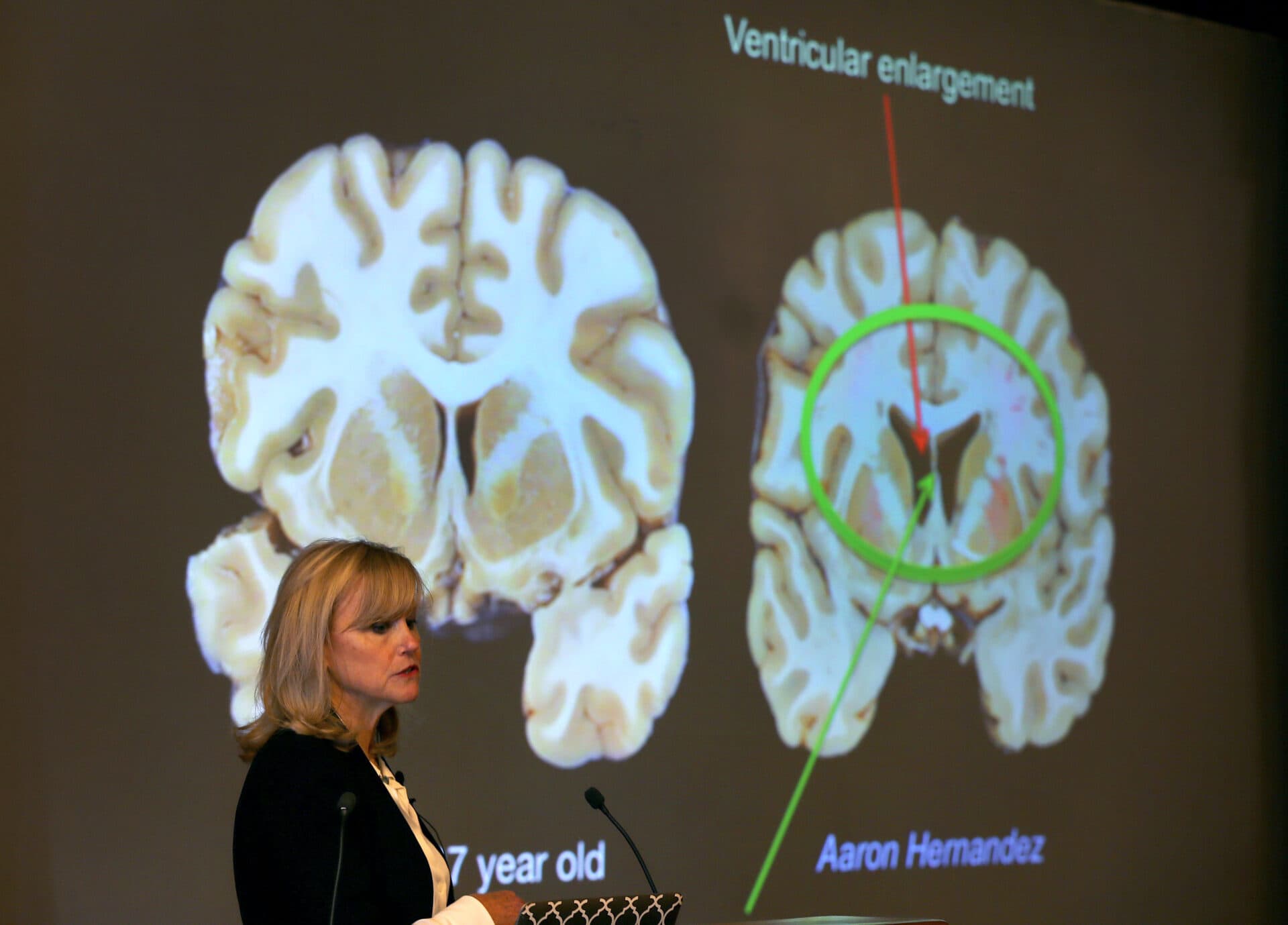Advertisement
Aaron Hernandez, infamous ex-Patriots star, sounded upbeat in final prison calls before suicide
Editor's Note: This story includes descriptions of suicide.
Days before his suicide, former New England Patriot Aaron Hernandez sounded triumphant in phone calls from prison, buoyed by a recent acquittal in his double murder trial that had him imagining a life outside bars, cleared of all criminal charges.
In newly released recordings of his phone calls, Hernandez was so bullish after his courtroom victory on April 14, 2017, that he entertained speculation about returning to football from his fellow inmates, who he said asked him, “Who you gonna play for?”

The 27-year-old was a celebrity inmate: Once a star tight end for the Patriots with a $40 million contract, Hernandez proved also to be a violent killer. Though he was acquitted in the double murder of two men in Boston he seemed to barely know, a jury in 2015 had already convicted him of killing a friend for reasons that were never clear.
In his last 36 hours, Hernandez in phone calls expressed optimism that he could still successfully appeal that guilty verdict, freeing him from his life-without-parole sentence.
“I’m great, man. One step closer,” Hernandez told a friend, according to a redacted recording of their phone conversation that state prison officials released after a lengthy public records fight. There is, he added, "light at the end of the tunnel.”
Within hours, Hernandez would be dead.
Hernandez’s suicide on April 19, 2017, left behind more than a cell adorned with biblical references in blood and rambling letters. His family and friends continue to wrestle with the contradiction of Hernandez’s final days: That a seemingly jubilant man who was planning visits with his daughter and her mother could suddenly kill himself.
The questions have fueled speculation about why Hernandez took his own life. Did an illicit drug he smoked in prison send him spiraling? Or was his death the byproduct of a head so addled by repeated blows that one medical expert said he had some of the worst brain damage she had seen in a football player?
Did he suffer from well-concealed depression? Or did the suggestion on a radio talk show, that he was gay, just days before his suicide, push him past the brink?

The newly released phone calls — nine in all, spanning his final two days — also offer fresh insight into Hernandez’s life and reflections behind bars.
In the mystery about what prompted Hernandez’s death, experts warn that suicide can rarely be distilled to a singular trigger.
“Most of the time, suicide is the result of a combination of a lot of factors,” said Eileen Davis, director of Call2Talk, a statewide suicide prevention hotline. “It’s almost like a perfect storm in your head. It might be something specific that brings you to that extreme act, but it is something that has probably been” brewing.
She also said it's also not unusual for someone to seem hopeful before a suicide. “Oftentimes, individuals that do take their own lives do sound more upbeat and positive in the hours, days, weeks prior,” Davis said.
“I’m going to fight to the end to get myself home. When I sit down, it’s game time, you know.”
Aaron Hernandez
The recordings of the nine phone calls Hernandez made before he hanged himself did not point to a cause. But the phone calls do provide some clues, as Hernandez made fleeting references to forces that may have hastened his death.
The recordings were obtained by WBUR and the Boston Globe after a public records battle with the state Department of Correction that began as a part of the Globe Spotlight Team’s 2018 series and podcast “Gladiator: Aaron Hernandez and Football Inc.,” produced in partnership with Wondery.
In one call, Hernandez described watching a fellow inmate “twitching and having a seizure” and vomiting blood after taking that “artificial sh--” — which sounded like a reference to the drug K2 that he himself had allegedly used. Often referred to as synthetic marijuana, the drug is sprayed onto paper or other material, then smoked. Hernandez said the inmate overdosed “right in front of my cell.”
Prison officials said they had no record of the incident Hernandez described. When Hernandez died, K2 was so rampant at Souza-Baranowski Correctional Center that outside the prison on a tree hung a sign with a skull and crossbones that warned “K2 is poison.”
The Spotlight Team reported in 2018 that prison officials concealed records after Hernandez’s suicide showing that another inmate reported Hernandez had been smoking the drug for two days before he died and “wasn’t in the right frame of mind.”
A postmortem toxicology screen of Hernandez’s blood was negative for K2 and other illicit substances, but state officials have declined to detail the thoroughness of the test. The drug can often be difficult to detect.
K2 is a synthetic version of the psychoactive ingredient in marijuana, but it can be far more dangerous, according to Dr. Nora Volkow, director of the National Institute on Drug Abuse. “These are synthetic cannabinoids that produce very, very severe psychosis,” Volkow said. “And those can be terrifying experiences,” which lead some people “to actually want to kill themselves.”
While a typical high might last a few hours, the psychosis can last for days. Volkow compared K2 to “Russian roulette” because users don’t know what chemical they are consuming.
A person who has suffered brain trauma is especially vulnerable to the dangers of the drug, Volkow said.
In another call, Hernandez mentioned the brain trauma endured while playing football. The context was difficult to determine because in the recordings, prison officials erased the voice of the person Hernandez was speaking to. It sounded like Hernandez was on the phone with another football player discussing a concussion-related lawsuit.
Hernandez referred to that “concussion sh--,” and vowed to “talk to my lawyers about it” because “it will benefit us all.”
After his death, Hernandez’s brain showed that he had one of the worst cases of chronic traumatic encephalopathy, or CTE, ever seen in someone so young. The degenerative condition is believed to be caused by repeated blows to the head.
While no direct link has been made between CTE and suicide, it is the most common cause of death for people under age 30 who, like Hernandez, donated their brains to the Boston University CTE Center, according to the center’s director, Dr. Ann McKee.

The trauma in Hernandez’s brain still stands out to McKee, who described damage so considerable to his frontal cortex that she determined he had stage-three CTE on a scale of four.
“That’s the kind we usually see in people that are in their 60s, 70s and 80s,” said McKee, a neuropathologist.
People suffering from CTE do exhibit “impulsivity and very sudden changes in behavior” and increased suicidal ideation, McKee said. “But it’s very hard to just blame or just point the direct link to CTE,” because so many factors often contribute to suicide.
The prison calls are also notable for what was not mentioned: Hernandez gave no indication on the calls whether he’d learned that, in the days before his death, a radio talk show in Boston had been making jokes about his sexuality, something he’d kept secret for years.
Hernandez’s mother declined an interview request. But in an email, Terri Hernandez mentioned the talk show and its jokes about her son’s sexuality as a potential reason for his suicide. She added, however, “We will never know.”
After Hernandez died, one of his former high school football teammates told the Globe that he and Hernandez had a sexual relationship while teenagers. Hernandez also told his mother he was gay during a visit in prison.
As is common with those who were close to suicide victims, Hernandez’s friends still struggle to understand why. In November 2022, five retired professional football players discussed Hernandez on a podcast, offering the most extensive comments on his death by those who knew him from the gridiron.
The five retired players, who did not respond to the Globe’s requests for comment, referred to Hernandez as “Chico,” his locker room nickname. As it happened, at least two of the retired players said they had spoken to Hernandez by phone hours before he killed himself.
“In that conversation he was the Chico I remember … happy, fun, just full of life, full of energy,” said Fred Taylor, a retired Jacksonville Jaguars and New England Patriots running back who has been involved in concussion litigation and is now a co-host of the "The Pivot" podcast. “When they say he allegedly committed suicide, it was hard for me to believe.”
Hernandez’s close friend, retired NFL star Maurkice Pouncey of the Pittsburgh Steelers, shared Taylor’s disbelief and said his initial reaction was that “someone killed him.”
Maurkice’s twin brother, Mike Pouncey, said Hernandez “called everyone that mattered to him” on his last day and “we all got that same impression,” that he sounded happy.
“When we heard the news the next day, ‘I’m like, bro, there’s no way. How? How?’ I got off the phone and we were laughing, everything was cool,” said Mike Pouncey, who was also an NFL star for the Miami Dolphins. “There was no indication leading up to that.”
“That’s why,” Mike Pouncey concluded, “you don’t know people when they’re behind closed doors.”
It took state corrections officials five years to release Hernandez’s final calls — and they ultimately provided only a small selection of those requested. Citing privacy concerns, the agency also excluded the voices of the people to whom Hernandez was speaking. Earlier this month, responding to an appeal, the Secretary of State’s office questioned the necessity of the redactions and ordered a review of the full recordings.
By contrast, both the Bristol and Suffolk county jails several years ago released the complete recordings of Hernandez’s phone calls requested by the Globe, disclosing the full conversations he had with family and friends.
A number of those jail calls were featured in the six-part “Gladiator” podcast. The Spotlight Team found that Hernandez, despite a difficult childhood with an abusive and tyrannical father, gained prominence as a singular football talent. But behind his on-field accolades, Hernandez was a chronic marijuana smoker and risk taker, with a propensity for guns and violence, who struggled with his sexuality in the hyper-masculine world of big-time football.
Raised in Bristol, Conn., Hernandez won a national championship with the University of Florida Gators before being drafted by the Patriots at age 20. But after three seasons in the NFL, Hernandez was marched out of his home in handcuffs, charged with and ultimately convicted of the 2013 murder of his friend Odin Lloyd in North Attleboro.
Hernandez would be accused of murdering two others — Safiro Furtado and Daniel de Abreu — in a drive-by shooting in Boston’s South End in 2012. Hernandez and the men were in the same nightclub before they were gunned down in their car. A jury acquitted him of those charges on April 14, 2017.
Five days later, a guard found Hernandez hanging from a bedsheet tied around the bars of a window in his cell at Souza-Baranowski in Central Massachusetts. He left letters, and religious writings on the walls in blood. A Bible reference, John 3:16, was written on his forehead in red. The medical examiner ruled his death a suicide.

Prison officials launched an investigation that found no evidence of foul play. However, a prison guard neglected his duties, skipping his 2 a.m. round to check on Hernandez and other inmates. That was the last hourly round before Hernandez was found dead.
Attorney George Leontire, who represented Hernandez, said in a recent interview that the suicide did not make sense because Hernandez sounded upbeat overall before his death.
“We were shocked,” Leontire said.
On one of the newly released calls, Hernandez said his acquittal felt like, “the whole world came off my back.” In his final two days, Hernandez called friends he had been unable to talk to during his trial. He joked about gaining weight, mentioned resuming his workout regime, and looked ahead to his next legal battle.
“I’m going to fight to the end to get myself home," he said. "When I sit down, it’s game time, you know."
The calls also show Hernandez had developed an intense relationship with a young inmate who was an aspiring rapper. The man had recently been released from prison and was living in a dangerous neighborhood, Hernandez said. Talking to the rapper by phone, Hernandez spoke like a mentor, urging him to swallow his pride and steer clear of violence.
“Just make sure you keep your head up. You’re bigger than that,” Hernandez said. He added, “All I’m saying is, take a deep breath. Don’t react off emotion.”
As he doled out advice, Hernandez reflected on his own choices. He talked about the people he’d surrounded himself with when he was a football star. He urged the young man to make better decisions. The Globe and WBUR have been unable to identify him.
“I was searching for love so I gave my love and loyalty to everybody to never get it in return. But where does that get you?” Hernandez said. “I’m not giving my love to all these people that don’t deserve it, and you shouldn’t either.”
In his final phone call, it was clear that Hernandez had reached his fiancee, Shayanna Jenkins-Hernandez, who declined to comment for this story. When he called, Jenkins-Hernandez was shopping with their daughter at Target.
Hernandez sounded both silly and affectionate, at one point telling his daughter she was “the most beautiful girl in the world.” He talked about visits in the coming days with his fiancee. He urged her to set up some one-on-one time between them, suggesting she occasionally leave their daughter with her mother when she made the trek to prison to see him.
Then suddenly, for a reason not clear on the recording, Jenkins-Hernandez had to hang up and the call was cut short.
“Go,” Hernandez said as he made kissing noises to his daughter and her mother. "Love you guys.”
Resources: You can reach the National Suicide Prevention Lifeline by dialing 988 and the Samaritans Statewide Hotline (call or text) at 1-877-870-HOPE (4673). Call2Talk can be accessed by calling Massachusetts 211 or 508-532-2255 (or text c2t to 741741).
This story is part of a collaboration with the Boston Globe. Before joining WBUR, Wallack and Healy had worked on the Globe Spotlight Team's "Gladiator" project.
Andrew Ryan can be reached at andrew.ryan@globe.com, Todd Wallack at twallack@bu.edu and Beth Healy at bhealy1@bu.edu.
This segment aired on March 28, 2023.
